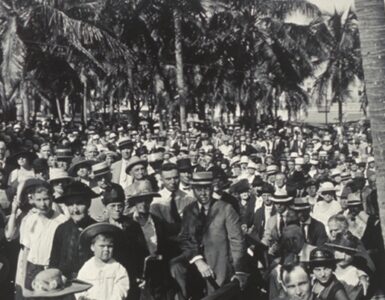As a Christian attending worship services over the years I have noticed a problem which is getting worse. While home due to illness one Lord’s Day, I watched the morning service of a prominent confessional Presbyterian congregation. The prelude music selections came to an end and the call to worship was given. As I looked at the people scattered sparsely in the pews, I thought, “What is wrong; where are all the people?” The service started, there was prayer, and hymns were sung. Slowly, the seats filled. It was about fifteen to twenty minutes after the call to worship before the congregants were all seated. About a half or more of the attendees were seated after worship began. It may be that some unusual event occurred just before the service contributing to the slow filling of the seats, but even so, it reminded me of late arrivals for church. The problem is not unique to Presbyterians because similar scenes on Sunday mornings are common in churches of other denominations. You may ask, “Why is being late to church a problem?” I will elaborate, but first I will caveat what follows noting that everyone has likely been late to church for unforeseen causes such as weather, transportation, responsibilities after Sunday School, or any one of a number of other valid reasons, but what I am about to say is with regard to those who know when church begins, but they choose not to be on time.
Calling God’s people together in corporate worship is a definitive act stating that the congregants are to clear their minds of the events of the week and focus on God by hearing the Word read and preached, praising Him with singing, praying, confessing the faith, bringing the tithes into the storehouse, and celebrating the sacraments. Corporate worship of the Triune God is unique; there is nothing else like it in the world. From the call to worship to the benediction, Christians concentrate on their Redeemer and participate in a liturgical package tied up with decency and order. You might be surprised by my use of the word liturgy and think it is inappropriate because many associate it with Roman Catholicism or the Orthodox Churches. No, any Christian church service whether it is traditional, contemporary, or hybrid, has a liturgy—it may not be a good liturgy, but it nevertheless has a liturgy. Even churches that do not follow a reformed order of worship have some type of beginning and end delimiting what occurs in-between. The worship service is a package.
Those who are intentionally late to services have a theological problem. The Creator of heaven and earth; the One in whom we live and move and have our being; the God who redeemed His people at the price of the Lamb’s blood; the Providential Provider that brings rain to fall on the just and the unjust; the Judge who justifies His people and separates their sins as far as the east is from the west; the Commander to whom all the nations of the earth are as a drop in the bucket; and Yahweh, the Covenant God, who knows our troubles and cares for us—He has called us into His presence for worship as the Spirit illumines our understanding and perfects our prayers. Is He not magnificent and gracious enough for service participants to be on time?
How does a casual attitude about timeliness for church affect your Christian testimony and evangelism? Do you think the friends you take to church so they can hear the Gospel might be curious as to why you always walk in the door with them late? Are they impressed by the greatness of God and the grace of the Gospel as you casually slip into your seat twelve minutes into the service? Might they think the Lord is not all that important to you because you are not concerned enough about your appointment with Him to be on time? Being intentionally late to church to avoid the first elements of the order of service because they do not appeal to you, or simply because of indifference about the worship package is a theological problem. Have you ever heard a Christian say, “All that matters is the sermon; the other parts are not important.” Reformed churches have rightly emphasized the importance of exposition and application of the Bible, but preaching the Word is one part of the worship package.
In the prosperous West, we live in a casual world. In the last hundred years or so clothes have become more comfortable, time off from work has increased recreation, communications can be accomplished casually at any time from a smart phone, and a casual way of thinking has affected the worship of God. God is gracious, forgiving, omnipotent, loving, just, and omnipresent, but one of His attributes is surely not casual. When I was in college, I had a conversation with one of my fellow dorm residents named Gary Jagodzinski. His surname is Polish and all residents of the hall had nicknames, so readers can guess as to the non-politically correct name Gary had. He was studying to be a missionary aviator and a mechanic. One day we were talking about church and the conversation turned to the subject of people being late for services. He said with reference to purposeful tardiness to worship, “It is a good thing Jesus was not late to the cross.” His comment cuts to the point. The prophets foretold the coming Messiah and there was a definitive timeline of events. When it was time for the crucifixion, it was accomplished, and Jesus said, “It is finished.” The Redeemer was on time as he followed the Father’s plan. Since Jesus was on time for the crucifixion, resurrection, ascension, and will be on time for His return, His people should consider being to church on time.
Barry Waugh
Notes. The church steeple picture with enough time to make the 11:00 service has been cropped for the header and is titled, “The Clocks on St. Paul’s,” by Corey Coyle and is from panoramio.com via Wikimedia Commons. The church is St. Paul’s Evangelical Lutheran Church in Wisconsin. This picture’s clock has the closest time to 11:00 that I could find.





